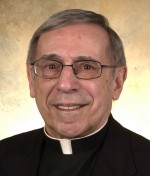GREENSBURG, Pa. (CNS) — Retired Bishop Anthony G. Bosco of Greensburg, who headed the diocese for nearly 17 years until his retirement in 2004, died July 2 at his home in Unity Township. He was 85.
Bishop Bosco’s body will be received at Blessed Sacrament Cathedral the afternoon of July 8, with family members receiving relatives and friends until a 7 p.m. celebration of evening prayer. The cathedral will remain open for visitation until 9 p.m. On July 9 there will be all-day visitation. At 7 p.m. Greensburg Bishop Lawrence E. Brandt will celebrate Mass for the repose of the soul of Bishop Bosco.
Philadelphia Archbishop Charles J. Chaput will celebrate the funeral Mass at 10 a.m. July 10. Interment will follow in the Bishops’ Plot at Greensburg Catholic Cemetery.
Bishop Brandt called his predecessor “a faith-filled, humble servant of the Lord who loved his priesthood and the church. He served the people of Greensburg with joy as their shepherd for 17 years,”
[hotblock]
“I always appreciated his friendship and wisdom. His passing is not only a great loss for the people of the Diocese of Greensburg, whom he loved, but it is great loss for the national and universal church that he served so faithfully for more than six decades,” Bishop Brandt added said in a July 3 statement.
Installed as the third bishop of Greensburg June 30, 1987, in Blessed Sacrament Cathedral in Greensburg, Bishop Bosco served the church as a bishop for 43 of his 61 years as a priest. Committed to the Second Vatican Council’s call to the laity, Bishop Bosco’s tenure in Greensburg was marked by a multitude of efforts to catechize the laity and bring them into a richer involvement with the church.
Bishop Bosco instituted “New Wine, New Wineskins: Revisioning the Parish Through the Ministry of the Parish Pastoral Council,” a process that focuses on parish leadership. He also began a regionalization effort to help parishes in a given area work together to fulfill the mission of the church.
He promulgated the diocese-wide effort “Journey of a Lifetime,” which focused on education in the Catholic faith as a lifelong process, and “Taste and See: Catechesis as Food for the Journey,” the diocesan catechetical guidelines.
Bishop Bosco led the diocese through the Catholic Church’s Great Jubilee of the Year 2000. The high point was the jubilee Mass, which he celebrated for 2,000 people at Latrobe Memorial Stadium, making it the largest Mass ever celebrated in the diocese.
He also had to deal with difficult issues. A changing economy, especially the loss of the area’s major industries — steel and coal — led to significant population declines in several parts of the diocese. That necessitated the closing of several parishes, decisions that met with varying degrees of public opposition.
Believing strongly that the diocese should increase endowments to ensure a stable future, Bishop Bosco launched a $25 million campaign, “Honoring Our Past … Shaping Our Future,” the diocese’s first capital campaign, on Sept. 21, 2000. The effort raised more than $28 million for the diocese and its parishes.
He was active in the media for much of his priesthood, including working with KDKA radio in Pittsburgh during Vatican II, hosting a television program, writing a column (“A View from the Bridge”) for The Catholic Accent, Greensburg’s diocesan newspaper, and providing commentary for “Accent on the Air,” the former diocesan radio newsmagazine.
On the national level, he served for many years on the U.S. bishops’ Committee on Communications, including service as its chairman.
He embraced new communication technology to evangelize and educate, overseeing development of a diocesan website and connecting all of the diocese’s parishes via a single network.
He also was active in ecumenical affairs as a member of the Christian Associates of Southwest Pennsylvania.
The Catholic Press Association honored Bishop Bosco with the 2001 Bishop John England Award, which is given to publishers in the Catholic press for their defense of freedom of the press and freedom of religion.
In 2001, he issued his pastoral letter, “On Bended Knee: The Eucharist and Service.”
Bishop Bosco was born in New Castle, Pa., Aug. 1, 1927, to the late Joseph and Theresa (Pezone) Bosco and raised on Pittsburgh’s North Side. He graduated from North Catholic High School in Pittsburgh and attended the former St. Fidelis Seminary in Butler County and St. Vincent Seminary in Latrobe. He was ordained a priest for the Diocese of Pittsburgh June 7, 1952, by then-Bishop John Dearden at St. Paul Cathedral.
Bishop Bosco, who earned a licentiate in canon law from the Pontifical Lateran University in Rome in 1957, served in several capacities in the Pittsburgh chancery and was named a monsignor in 1968. His many duties also included service as a chaplain and instructor at Mercy Hospital School of Nursing in Pittsburgh (1957-71) and chaplain to the Sisters of the Holy Spirit, Ross Township (1971-87).
He was ordained a bishop for the Diocese of Pittsburgh June 30, 1970, and served there as an auxiliary bishop until his appointment to Greensburg after Bishop William G. Connare’s resignation in 1987.
Bishop Bosco remained active in retirement, celebrating Mass at Blessed Sacrament Cathedral as recently as June 29. He also worked in various educational capacities, serving as a facilitator for the University of Dayton’s Virtual Community for Lifelong Faith Formation and teaching a religion class at Seton Hill University.
He is survived by his brother, James J. Bosco, and his sister-in-law, Sharon, of Kalamazoo, Mich.; three nephews, Mark, James and Joseph Bosco; and two nieces, Joanne Bosco and Gina Bosco.
PREVIOUS: New guidelines aim to help houses of worship address gun violence
NEXT: With final rules from HHS, bishops need to ‘continue defending’ rights




Share this story